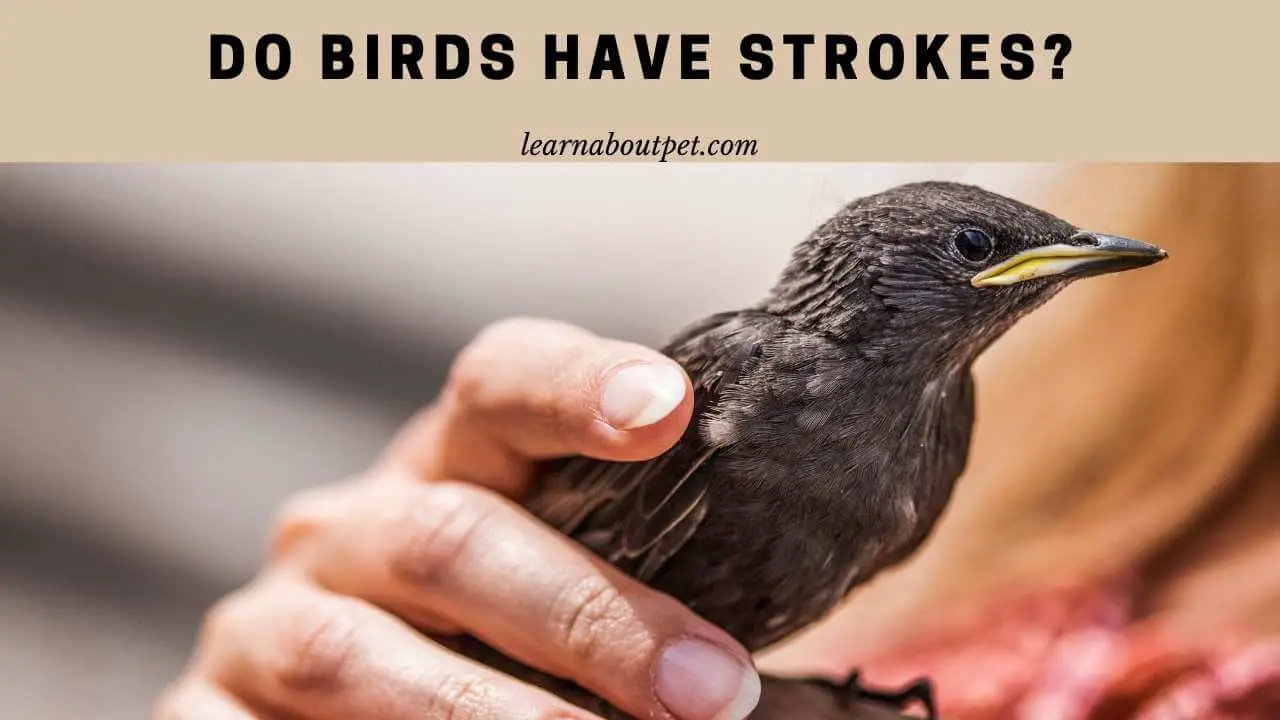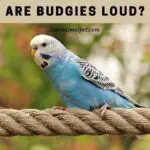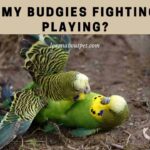There are situations where you may start suspecting that your bird is having a stroke. That is for instance if he falls from a perch, makes a screaming sound, becomes disoriented and develops paralysis. This would lead you to pose the question: can birds have strokes? That is the question we will be exploring in this article.
Do birds have strokes? Well, cockatiels, lovebirds and budgies, especially those that are of advanced age, may sometimes experience strokes. On the other hand, the chances of a younger bird suffering a stroke are rather low.
Once you discover that your bird has suffered a stroke, the most important thing to do would be to get him to a vet immediately. The vet will first examine the bird, to ascertain whether indeed he has experienced a stroke.

If it is indeed a stroke, the vet will come up with a treatment plan, to address its effects on the bird. He will also try to figure out why the bird suffered a stroke, and what can be possibly done to reduce chances of recurrence.
We will venture to find out whether birds have strokes, and if they do, what the symptoms are like. We will also look at what you can do about bird strokes.
Do Birds Have Strokes?
The simple answer is yes. Birds do experience strokes. But (thankfully) strokes in birds are quite rare. Where they do occur, it is typically in older birds. Very rarely would a young bird suffer from a stroke.
There are two major types of strokes in birds. Firstly, there are cerebral strokes. These typically occur when there are reductions or interruptions of blood supply to parts of birds’ brains. Then there are heat strokes. These occur due to exposure to extremely high heat conditions, leading the body to be unable to control temperature.
Why Do Birds Have Strokes?
The can birds get strokes question is usually followed by another one, on why exactly the birds have strokes. So, indeed, why do birds have strokes? In the case of cerebral strokes, the primary reason is reduction or disruption of blood supply to part of the brain. And in the case of heat strokes, the primary reason is unbearably high temperature conditions.
In the case of cerebral strokes, there may be other underlying conditions, typically including cardiovascular problems. For instance, when there is narrowing and/or hardening of arteries, it can eventually lead to a stroke. Long term stress, poor diet, excess weight and lack of exercise are some of the factors that may ultimately lead to stroke in birds.
When Do Birds Have Strokes?
Birds typically have strokes in their old age. This is not to say that young birds are entirely immune from strokes. It is just that the probability of a young bird having a stroke is low.
Another way of answering the question on when do birds have strokes is by looking at situations during which the strokes normally occur.
Sometimes, a bird will have a stroke while perched: typically causing it to fall and become disoriented for a while. At other times, a bird will have stroke while flying, causing it to fly into a wall, fall and become disoriented. It is also not unheard of for birds to have strokes while sleeping. In the latter case, you may only discover the bird disoriented, paralyzed and possibly blind in the morning.
| Common Signs of Stroke in Birds |
|
Can Birds Recover From Stroke?
Many of the people who pose the do birds have strokes question usually follow it up with another one, on whether birds can recover from strokes. And the answer (thankfully) is ‘yes’, birds do often recover from strokes. But there are also cases where, unfortunately, birds die from strokes. Therefore a bird that has suffered a stroke may recover. But the bird could also lose the battle.
One key determinant of whether or not a bird recovers from a stroke is how bad the stroke was. If it was a ‘small’ stroke, the bird is more likely to recover well and fast. But if it was a ‘big’ stroke, the recovery may be slower or impossible.
Whereas a bird may recover from a stroke, he may not go back to his previous state of fitness. The bird may not be able to do some of the things he previously did with ease. This is an important thing to take note of, with respect to bird stroke recovery.
Can A Bird Have A Seizure?
Closely related to the do birds have strokes question is one on whether birds can have seizures. The answer is yes, birds can have seizures. The seizures are typically characterized by convulsions (jerks), followed by disorientation. By the way, what looks like a bird seizure may, in fact, be a bird stroke playing out. In other words, apparent seizures are among the classic bird stroke symptoms.
Witnessing a bird having a seizure can cause the owner a lot of stress, especially if it is the first time. In cases of birds having seizures, it is the convulsions phase (where the bird’s body moves fast and involuntarily) that can be scariest.
One may pose a question on why do birds have seizures? The simple answer is that birds have seizures due to abnormal (electrical) discharges in the nervous systems. These discharges may be due to neurological disorders in birds, infections, tumors, lack of certain nutrients among others.
What To Do If A Bid Is Having A Seizure?
The first course of action is to remove things that may cause the bird injury. If the bird that is having a seizure is on a perch, it may be a good idea to get him down: to protect him from having a nasty fall. The second course of action is to take the bird to a vet immediately. The vet will try to figure out what is causing the seizure, and possibly develop a treatment plan.
Do Birds Have Heat Strokes?
Yes, birds do sometimes experience heat strokes. Therefore when answering the do birds have strokes question, it is important to point out that besides cerebral strokes, birds can also have heat strokes.
The heat strokes occur as a result of the bird being in conditions that are too hot. A bird that is having a heat stroke may have altered behavior, and possibly fall off its perch. Another common manifestation of heat stroke in a bird may be seizure. Therefore if you are witnessing a cockatiel seizure or a parakeet seizure on a very hot day, it could very well be on account of heat stroke. You can also have a situation where a bird won’t move but is alive.
Do Young Birds Have Strokes?
Strokes are rare in young birds. In most of the cases where we witness strokes in birds, the victims are usually those that are older. Nonetheless, it is still possible for a young bird to have a stroke. So it is rare, but not altogether impossible.

Do Old Birds Have Strokes?
Older birds tend to be more prone to strokes than young birds. Of course, this is not to say that every older bird must have a stroke. There are birds that live very long lives, without ever suffering strokes. Therefore just because a bird is old doesn’t automatically mean that he will suffer a stroke.
A question may arise on why do birds have strokes in their older years? And the answer is because the arteries tend to narrow and harden with age. This is what increases the risk of strokes in older birds.
What Does A Bird Stroke Look Like?
One common sign of stroke in a bird is falling – sudden falling. The bird may make a screaming noise while falling. Thereafter, the bird may experience blindness or paralysis, typically on one side. There may also be some sort of seizure.
In the long run, there may be change in the bird’s behavior, loss of appetite and ataxia. (By the way, can a bird die from ataxia? Well, while ataxia itself may not kill a bird directly, the imbalance associated with it may make the bird more prone to nasty falls that ultimately kill it).
As a matter of fact, if you were to follow up on why do birds fall off their perch, you would discover that ataxia is implicated in many of the cases.
Of course, the actual manifestation of a stroke in a bird will depend on how big the stroke is. It may also depend on the bird’s breed. For instance, there may be slight variation between cockatiel stroke symptoms and parrot stroke symptoms.
One may ask, can a bird have a heart attack (if it is capable of having a stroke)? And the answer is ‘yes’, a bird can have a heart attack. And a bird’s heart attack may be just as lethal as a human heart attack.
What Is The Treatment For Bird Strokes?
Sometimes, there may be administration of medications to alleviate the symptoms brought about by the stroke. There are also those who have tried various forms of physical therapy for birds, in a bid to resolve the disabilities that the strokes are known to cause.
But the main focus in bird stroke treatment is to minimize chances of a stroke reoccurring. Therefore the treatment may entail blood pressure control, dietary changes and heart medications.
One may ask: do birds have strokes multiple times? The answer, unfortunately, is yes. Once a bird suffers a stroke, chances of him suffering another one are quite high. That is why the focus of bird stroke treatment is to minimize the chances of recurrence. Once a vet is able to figure out exactly why there was a stroke, he has a better chance of preventing its recurrence.
What are Bird Stroke Complications?
After getting the answer to the do birds have strokes question, one may pose another one on bird stroke complications. So this is a question on what complications tend to occur as a result of strokes in birds. Or, more specifically, it is a question on what complications one may expect, if their bird has suffered a stroke recently.
As it turns out, one common complication that arises as a result of stroke in birds is loss of balance. Therefore, following the stroke, the bird becomes more prone to falling. And the bird may also have difficulty flying (or indeed even walking) in a straight path.
Another one is paralysis. The bird may have paralysis on one side of its bird. Sometimes, the said paralysis improves with time. But there are also unfortunate cases where it becomes permanent.
There is also blindness. Again, this is more likely to be on one eye (though there are also cases where both eyes suffer). In this case too, eyesight may improve with time. But we also see cases where the blindness turns out to be permanent.
Final Verdict – Do Birds Have Strokes
Do birds have strokes? Birds do sometimes experience strokes. The strokes are commoner in older, rather than younger, birds. Certain species of birds (for instance, parrots, cockatiels and budgies) seem to be more prone to the strokes.

Once you suspect that your bird is having a stroke, the best thing to do is get him to a vet immediately. Ideally, this would be an avian vet, who is familiar with bird diseases. The vet will then get to do proper diagnosis, and initiate an appropriate treatment plan.
As a Pet lover, make you sure you commit to learn about pet more in detail to give them a healthy and long lasting life.

Welcome to Learn About Pet. My name is Rajkumar Ravichandran and I love all pets, travel, and amazing food. I write about my passion and personal experience caring for multiple pets in this blog! ❤️
Post Disclaimer
DISCLAIMER: THIS BLOG OR WEBSITE, "Learn About Pet", DOES NOT PROVIDE YOU WITH MEDICAL ADVICE AND IS NOT A SUBSTITUTE FOR MEDICAL ADVICE. ALWAYS GET IN TOUCH WITH YOUR PERSONAL VETERINARIAN AND USE INFORMATION HERE AS GENERAL ADVICE.
The information, including but not limited to, text, graphics, images and other material contained on this website are for informational purposes only. No material on this site is intended to be a substitute for professional veterinary advice, food recommendation, diagnosis, or treatment. Always seek the advice of your veterinarian or other qualified health care provider with any questions you may have regarding a medical condition or for pet food related questions.







